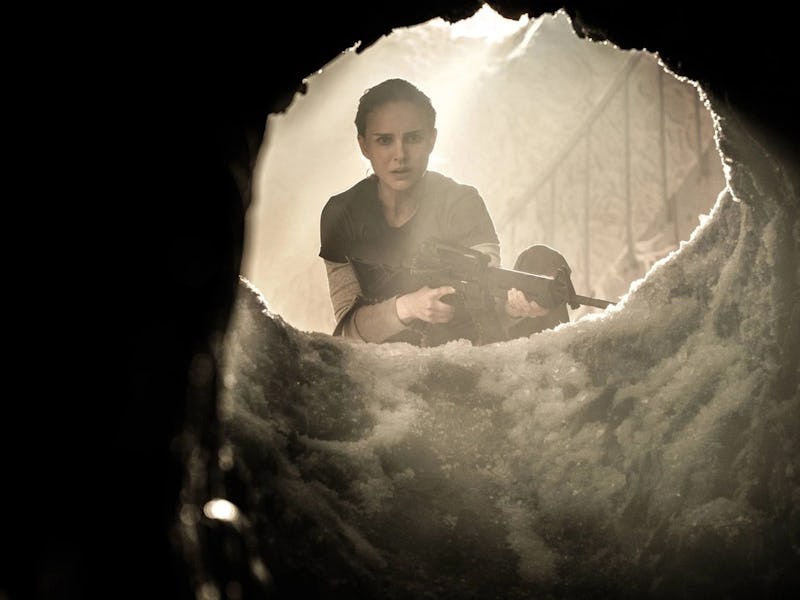Alex Garland’s Most Underrated Movie is a Cosmic Horror Masterpiece
“It'll grow until it encompasses everything.”

Cosmic horror is a difficult genre to get right. Unlike most horror subgenres, it doesn’t rely on gore, ghosts, or kills for the source of its scares. Instead, the unique genre essentially mines all of its horror out of two universal, all-too-relatable questions: What is our purpose in the universe? And are we alone in it?
Most cosmic horror stories explore what it would be like if the worst possible answers to those questions turned out to be correct. What, after all, could be scarier than discovering that there not only isn’t any purpose to our existence but that we are truly insignificant compared to the enormity of the universe? In many of the genre’s most famous entries, some of which were written by H.P. Lovecraft, the universe’s grand indifference toward humanity is rendered as fictional, inconceivably powerful eldritch beings like Cthulhu and Azathoth.
Those creatures are extremely difficult to bring to life on the big screen well, as is the incorporeal nature of the universal indifference that permeates throughout the cosmic horror genre. For those reasons and more, not many filmmakers have attempted to make a live-action cosmic horror story. In 2018, Alex Garland did with his extremely underrated sci-fi horror thriller, Annihilation.
Based on Jeff VanderMeer’s 2014 novel of the same name, Annihilation follows Lena (Natalie Portman), a biology professor whose world is turned upside down when her husband, Kane (Oscar Isaac), returns home from a mysterious special forces mission. When Kane gets sick and starts acting strangely, Lena begins to learn about the dangerous quarantine zone known as “The Shimmer,” which Kane and his team were ordered to investigate. Lena, specifically, learns that the zone was the site of a meteor strike several years prior.
Lena volunteers to embark on a new expedition into the Shimmer with a team of four other, highly-qualified women. Once they enter the Shimmer, however, Lena and her companions find themselves in an environment where plants, animals, and human beings have all begun to mutate. In case that wasn’t disorienting enough, Lena and her fellow team members quickly begin to realize that their own bodies and minds are being affected and genetically twisted by the Shimmer’s mutative effects.
It isn’t long before the characters all begin to lose their grip on what’s real and what isn’t. While that aspect of Annihilation is quite effective and helps set up the film’s mind-bending climax as well, it isn’t quite as overbearing as the sense of dread that begins to steadily ramp up the moment that Lena enters the Shimmer. It isn’t easy to make the world itself seem dangerous on-screen, but Garland, cinematographer Rob Hardy, and the Annihilation visual effects team effectively depict the Shimmer as a realm of constantly-mutating plants and animals.
In Annihilation, humanity is forced to come face to face with the cold indifference of nature itself.
The infectious dread of the film isn’t just the result of the mystery surrounding its central quarantine zone, either. It’s also the result of just how inescapable the Shimmer’s effects feel. The more that Lena and her teammates are changed both mentally and physically by it, the more horrifying Annihilation becomes. It isn’t long before it seems like Lena and the rest of Annihilation’s characters are destined to be totally assimilated by the Shimmer.
And that’s what makes Annihilation such a rare and effective cosmic horror film. The thriller manages to make the very thought of mutation and evolution seem horrifying, which is proof enough of just how well it taps into the cosmic horror genre’s unique brand of terror.
The Shimmer, as well as the alien organism that creates it, isn’t terrifying because it has the ability to destroy Lena and her teammates. Obviously, the concept of humanity being wiped out by an alien force isn’t a new one. What makes the alien threat in Annihilation so terrifying is, instead, just how indifferent it is toward humans.
“Our bodies and our minds will be fragmented into their smallest parts until not one part remains.”
As Jennifer Jason Leigh’s Dr. Ventress says near the end of the film, “It's not like us ... it's unlike us. I don't know what it wants, or if it wants, but it'll grow until it encompasses everything.” The film’s alien organism doesn’t, in other words, intend to destroy humanity because it wants to or because of some malevolent aspect of its personality. It simply wants to grow and evolve. Unfortunately, one byproduct of it doing so is the complete assimilation of any human that comes into contact with it.
Cosmic horror is unique because its stories don’t usually revolve around humans killing other humans or ghosts tearing the living apart. The genre is at its best when it is, instead, able to capture the cold indifference of nature. A tree’s roots don’t, for instance, tear up a concrete sidewalk because they have anything against the sidewalk. It’s simply in the tree’s way.
The same is true for Lena, Ventress, Kane, and everyone else in Annihilation, a film that ambitiously tries to honor the cosmic horror genre in all its weird glory and does so unsettlingly well. Five years later, the film not only remains surprisingly underrated, but it also ranks as one of the best and purest comic horror movies that Hollywood has ever produced.
Annihilation is available to stream now on Paramount+.
This article was originally published on